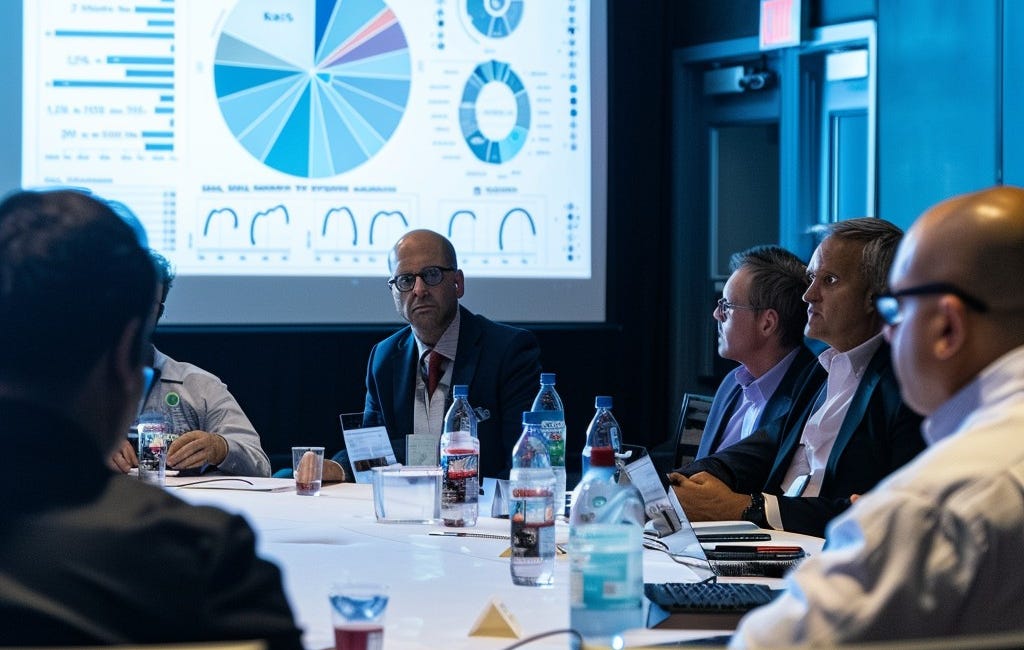Haere mai/welcome to April! It’s hard to believe we’re already into the second quarter of 2025, although the shorter days and increasingly cold weather should be a good clue!
I hope you, your colleagues, and loved ones have managed to navigate the first quarter safely and have been able to keep healthy and well through the many societal ebbs and flows that are spilling over into our mahi. This month, we look at the health and safety reforms recently announced by the government and the 2025 well-being report from Umbrella Wellbeing, as well as the usual cornucopia of resources, research, and events.
As ever, a quick plug before the newsletter proper begins. I undertake this mahi on top of my paid work (and unpaid work as a dad of 4!) and my goal is to keep it free and open access for as long as possible. I would greatly appreciate it if you can share this resource among your professional networks, encourage those you know to subscribe, and - of course - like and comment on posts.
This month:
News
Recently, the government has announced a suite of (initial) reforms to health and safety legislation in Aotearoa. As MBIE reports, these reforms include:
cutting back requirements for small businesses
focusing legislation on critical risks
“clarifying the boundaries between the [Health and Safety at Work] Act and regulatory systems that already manage the same risk”1
reducing notification requirements for businesses
setting up a hotline for the so-called ‘sea’ of road cones
freeing up land for recreational use and ensuring managers and owners’ duties “are reasonable and proportionate”
“clarifying the distinction between governance and operational management health and safety responsibilities”2; and
increasing certainty for businesses by making changes to the model for approved Codes of Practice.
Workplace Relations and Safety Minister Brooke van Velden has indicated these reforms have been informed by extensive consultation and are aimed at both cutting red tape and clarifying requirements for businesses.
Sector experts, however, highlight the lack of engagement with key stakeholders and the evidence, suggesting the reforms “have fixed 'non issues' and fail to address what most needs to be done in the area.”3
Worryingly, Van Velden has cited removing the need for plans to manage psychosocial harm in small businesses as one example of easing the burden for those enterprises. Such proclamations, however, are likely to do more harm than good.
All Workers Deserve Protection from Harm
Following a call for submissions on a review of the health and safety legislation in Aotearoa New Zealand, this week, the government has announced its first milestone in the amendment journey.
More reading:
Health and safety announcements fail to address the big issues.
Workplace Relations minister announces plans to relax health and safety laws.
As I noted in my last update, mid-March marked Neurodiversity Celebration Week. Building on that theme, April marks World Autism Month. On April 2, Autism NZ held a “national ‘quiet hour’” - Hoods Up, Volume Down - to raise awareness. While that event has passed, the organisation has several resources available to improve our understanding of autism, which affects roughly 2% of New Zealanders.
Recently, Umbrella Wellbeing released the 2025 edition of its annual workplace well-being report. This year, the organisation has focused on the issue of presenteeism - continuing work when you feel mentally or physically unwell - at work. This issue can have significant implications for businesses, resulting in real losses and increasing the risk of errors and likelihood of workplace injuries and accidents.
The research, which used data from 8,634 workers from across Aotearoa yielded some key findings [note: all quotes are taken from the report]:
most workers (7,512) “reported engaging in presenteeism at some point in the last month (87%)” [p.9]
27% “reported often or always working while mentally unwell”
19% “reported often or always working while physically unwell”
those who reported presenteeism experienced a range of effects, such as being unable to focus, feeling less energetic, or struggling with work stressors
presenteeism leads to an average monthly loss of 6.25 “productive days” for each worker and “a monthly business cost of $2,032 per employee” [p.10]
non-work factors, such as financial or whanau-related stress, are a better predictor of presenteeism than work factors
“poor organisational wellbeing support triples a worker’s odds of engaging in mental health presenteeism and doubles their odds of engaging in physical health presenteeism” [p.13]
attitudes towards attendance at work are significantly influenced by leadership and organisational and team culture, and:
mental presenteeism is influenced by “factors like workload and organisational support” [p.18]
physical presenteeism is influenced by “high workload and poor job autonomy…along with organisational support” [p.18]
“employees are much more prone to presenteeism during remote rather than on-site work” [p.27]
there are several steps employers can take to both prevent and reduce the incidence of presenteeism at work
these can be implemented at several levels (i.e., organisation, team, and individual)
For many workplaces across Aotearoa, offensive behaviour at work - including bullying, harassment, discrimination, and all forms of abuse - is an on-going concern. According to WorkSafe, in 2021 35% of workers reported being exposed to at least one example of such behaviours in the preceding 12 months. Similarly, in 2024 the Human Rights Commission highlighted significant rates of bullying and harassment in NZ workplaces, at great cost to individuals, businesses, and society.
Spotlight on Workplace Bullying
The Mental Health Foundation’s annual Pink Shirt Day appeal - an event focused on raising awareness of bullying in all its forms and contexts - is set to take place later this week; it serves as a timely reminder for understanding workplace bullying.
Dr Rhiannon Watson and Dr Lucy Hammans - researchers from Otago University - have put the spotlight on this issue for female MPs in Aotearoa.
Watson said threats of physical and sexual violence had become commonplace for female parliamentarians, with MPs reporting being threatened in person, over the phone, online on social media and in emails.
Hammans said misogyny was ubiquitous in the harassment of female MPs, which also targeted their staff, and their families, and was further complicated by racism for some.
Levels of harassment rose when women attained more senior roles, and when they were in government rather than opposition roles, the research found.4
This research, while narrow in its focus, again highlights this important issue and the potential harm it can result in. While employers’ sphere of influence is not absolute, they have a legal and moral duty to protect all workers safe and, as far as practicable, manage the risks associated with offensive behaviours.
Read more:
In other news…
WorkSafe is investing $2.7 million in boosting its inspectorate workforce.
An unlicensed asbestos remover has been sentenced for pocketing more than $20,000 by misrepresenting his employer.
WorkSafe has identified that basic machine safety failures, where obvious risks were overlooked, resulted in a worker’s death at a fertiliser company.
In the UK, employers are being urged to prepare for legislative changes that will see women receive long-overdue rights at work.
In Australia:
Resources
Winter is coming! My enjoyment of Game of Thrones aside, the onset of the colder weather brings the spectre of the flu season. The team at WorkingWise has written about the importance of flu vaccinations and the risks associated with this - and other - winter illnesses.
Despite the autumnal weather, though, there are still lots of opportunities to connect with nature, a key, evidence-based method for boosting health and well-being. The benefits of connecting with nature are wide-ranging and include those related to physical health (e.g., lowering blood pressure), cognition (e.g., improving concentration), and mental health (e.g., lifting mood).
The Mental Health Foundation has put together a handy resource on ways you can connect with nature at home and work.
A rise in medicinal cannabis use - from 9% in 2022/23 to 37% in 2024 - poses interesting considerations for work. Te Puna Whakaiti Pāmamae Kai Whakapiri/New Zealand Drug Foundation has developed the Medicinal Cannabis: A Guide for Employers and Employees resource, which provides useful information and guidance on this often-thorny topic.
Distractions are a common feature of modern working life that have the potential to have a significant effect on health and safety at work. In addition to strategies for designing the workplace to limit distractions, the team at Umbrella Wellbeing has written about the phenomenon of ‘focus hygiene’.
This focuses on mental clarity and resilience and includes tips for how we can improve our attentiveness and reduce the effect of distractions at work.
Frequent readers of this newsletter will know I’m a fan of the Psych Health and Safety Podcast from FlourishDx. Two recent episodes are really worth a listen:
Do individual-level interventions work? with William Fleming; and
Psychosocial Safety in Micro Businesses - with Dr Leanne Faulkner.
Do you follow any podcasts related to work and/or H&S? Let me know in the comments - I’m always interested in checking out other resources I can explore!
Research
After being MIA last month, here is some research I found interesting from the last few weeks:
US researchers undertook an analysis of 32 studies examining the link between holidays and mental health. The authors found that the post-holiday benefits may last longer than previously thought, while also identifying specific elements that benefit well-being. These included mixing time away and at home, engaging in physical activity during the break, and mentally detaching from work.
A 2024 study in Humanities and Social Sciences Communications looked at the mental health implications of adopting artificial intelligence at work. The authors noted that adopting AI at work increases stress for workers, which may raise the risk of burnout. However, this stress is reduced if we have a positive belief in our ability to learn and adapt to the technology.
A meta-analysis in the Journal of Business Research examined the phenomenon of ‘knowledge hiding’, a common behaviour associated with bullying. Knowledge hiding was shown to be associated with poor HR practices and “destructive” leadership practices. Such behaviour was shown to have significantly effect on the well-being of workers exposed to it.
A cross-cultural study from 2023 examined the mechanisms affecting outcomes associated with workplace incivility. Findings highlighted the negative effect incivility has on job satisfaction and withdrawal (even when employers take complaints seriously), the complex relationships between experiences of incivility and other contextual factors, and the influence of policy and practices on employers’ responses to complaints of incivility.
Using a longitudinal, cross-sectional design, a Swedish/Australian research team examined the efficacy of an intervention aimed at improving the psychosocial safety climate (PSC) at a manufacturing firm. They found the intervention - building managers’ capability via training - was successful in improving the PSC and reducing psychosocial risks, with these effects lasting at 18 months post-intervention.
If you’ve encountered research you’d like to share with other readers, please add details in the comments!
Events
If you’re looking for professional development opportunities here are some upcoming events.
April
15 - Assessing the Maturity of your Approach to Mental Health at Work, 1-2.30pm (NZST), online, (Flourish Dx).
16 - Aotearoa Māori Health and Safety Conference, 8.00am - 4.15pm, Claudelands Events Centre, Hamilton (GHSL).
30 - Tier 2 Leaders Health, Safety, and Wellbeing Breakfast Event, 7.30-8.30am, MPI Charles Fergusson Building, Wellington, (GHSL).
May
1 - May Day Hui: Fight Back Together, 12-3.00pm, Nationwide (NZCTU).
8 - Women in Safety Conference, Eden Park, Auckland (Safeguard).
22 - Public Sector Early in Careers Health and Safety Certificate, 1-4pm, online, (GHSL).
26-28 - NZOHS Work Related Health Conference, Auckland.
June
4 - Using Work Design in Psychosocial Risk Management, 11.00am-3.00pm, online, (Heart and Brain Works).
5 - Government Health and Safety Lead’s H&S Rep Conference, 9.45am-4.30pm, Wellington.
12 - Psychological Safety Senior Leader Forum, 9.00am-12.00pm, Princes Wharf, Auckland (Business Leaders’ Health and Safety Forum).
16-18 - Safeguard National Health and Safety Conference, Viaduct Events Centre, Auckland (Safeguard).
17 - NZ Workplace Health and Safety Awards Gala dinner, Viaduct Events Centre, Auckland.
24 - Psychosocial Risk Management Made Simple, 11.00am-3.00pm, online (Heart and Brain Works).
Thanks very much for checking out this month’s newsletter; if you have suggestions for more content or you’d like to reach out, please get in touch or engage in the discussion online.
Until next month, be well, be safe, and take care; noho ora mai.
Matt
MBIE (2025, April 4). First set of changes for health and safety reform.
Ibid.
RNZ (2025, April 4). Health and Safety announcements fail to address the big issues.
RNZ (2025, April 9). Research finds rape threats against female MPs common.






